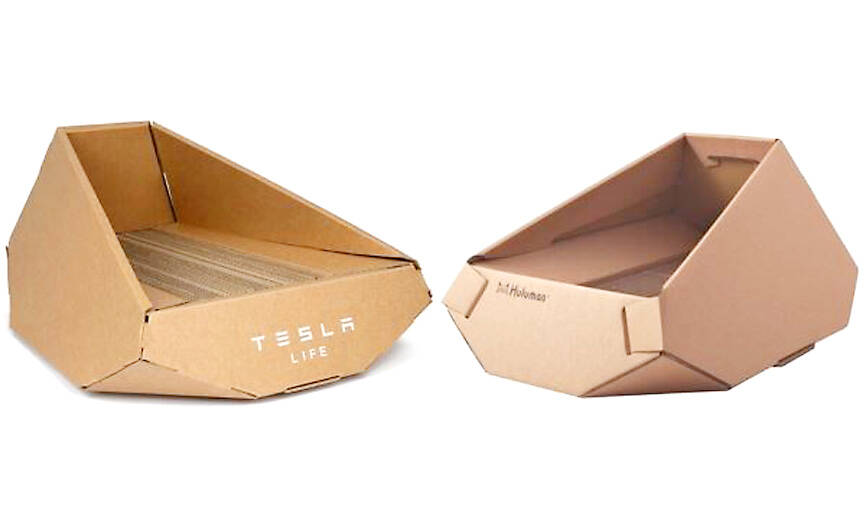Hulumao (呼嚕貓), a Taiwan-based producer of cat furniture and accessories, has cried foul after Tesla, the world’s most valuable automaker, began selling a cardboard cat bed in China that closely resembles one of its products.
The Tesla product, which recently went on sale on the company’s Web site in China and e-commerce platforms such as Taobao, is marketed as resembling the firm’s yet-to-be-released Cybertruck.
Earlier this week, Taiwanese YouTuber Jeff Young released a video pointing out the bed’s similarity with a cat “lounge chair” put out by Hulumao in 2017, adding that without the logo, the two products are “more or less 95 percent identical.”

Photo: CNA
Hulumao founder Hsiao Shih-chang (蕭世昌) said in an interview yesterday that he and his wife launched the company in 2016 and had rolled out seven different cat bed models to date, four of which have been copied and sold by firms in the Chinese market.
Crucially, Hulumao does not hold patents on its products, Hsiao said, citing advice from lawyers that it is very difficult to secure intellectual property rights over such DIY-style products.
“We would need to apply for an external design patent, the details of which — such as size and dimensions — are often quite controversial ... unless it is the product of a large company,” he said.
Despite this, Hsiao said companies that he suspected of copying Hulumao’s designs — possibly including Tesla — had already won patents in China, judging by the photographs used in their applications.
In a Hail Mary of sorts on Monday, Hulumao published both a Chinese and English letter to Elon Musk on its social media pages, “thanking” the Tesla founder “for promoting our product with [the] Tesla logo on it and selling it in China.”
“[However], we are sure we have never manufactured this model for [Tesla] in China nor licensed the design to you. There must be something misunderstood in this matter,” the post read.
A representative for Tesla’s brand in Taiwan could not be reached for immediate comment on the allegations.
As for Hulumao, Hsiao said the company owed its start to his wife’s love of cats, as well as her creativity in crafting cat beds and accessories distinct from others on the market.
“Our products’ main appeal is their uniqueness of design,” he said.
Asked about the strange experience of seeing a highly similar product being sold as the branded merchandise of a global corporate behemoth such as Tesla, Hsaio replied: “I guess there’s not really much we can do.”

A preclearance service to facilitate entry for people traveling to select airports in Japan would be available from Thursday next week to Feb. 25 at Taiwan Taoyuan International Airport, Taoyuan International Airport Corp (TIAC) said on Tuesday. The service was first made available to Taiwanese travelers throughout the winter vacation of 2024 and during the Lunar New Year holiday. In addition to flights to the Japanese cities of Hakodate, Asahikawa, Akita, Sendai, Niigata, Okayama, Takamatsu, Kumamoto and Kagoshima, the service would be available to travelers to Kobe and Oita. The service can be accessed by passengers of 15 flight routes operated by

MORE FALL: An investigation into one of Xi’s key cronies, part of a broader ‘anti-corruption’ drive, indicates that he might have a deep distrust in the military, an expert said China’s latest military purge underscores systemic risks in its shift from collective leadership to sole rule under Chinese President Xi Jinping (習近平), and could disrupt its chain of command and military capabilities, a national security official said yesterday. If decisionmaking within the Chinese Communist Party has become “irrational” under one-man rule, the Taiwan Strait and the regional situation must be approached with extreme caution, given unforeseen risks, they added. The anonymous official made the remarks as China’s Central Military Commission Vice Chairman Zhang Youxia (張又俠) and Joint Staff Department Chief of Staff Liu Zhenli (劉振立) were reportedly being investigated for suspected “serious

ENHANCING EFFICIENCY: The apron can accommodate 16 airplanes overnight at Taoyuan airport while work on the third runway continues, the transport minister said A new temporary overnight parking apron at Taiwan Taoyuan International Airport is to start operating on Friday next week to boost operational efficiency while the third runway is being constructed, the Ministry of Transportation and Communications said yesterday. The apron — one of the crucial projects in the construction of the third runway — can accommodate 16 aircraft overnight at the nation’s largest international airport, Minister of Transportation and Communications Chen Shih-kai (陳世凱) told reporters while inspecting the new facility yesterday morning. Aside from providing the airport operator with greater flexibility in aircraft parking during the third runway construction,

American climber Alex Honnold is to attempt a free climb of Taipei 101 today at 9am, with traffic closures around the skyscraper. To accommodate the climb attempt and filming, the Taipei Department of Transportation said traffic controls would be enforced around the Taipei 101 area. If weather conditions delay the climb, the restrictions would be pushed back to tomorrow. Traffic controls would be in place today from 7am to 11am around the Taipei 101 area, the department said. Songzhi Road would be fully closed in both directions between Songlian Road and Xinyi Road Sec 5, it said, adding that bidirectional traffic controls would